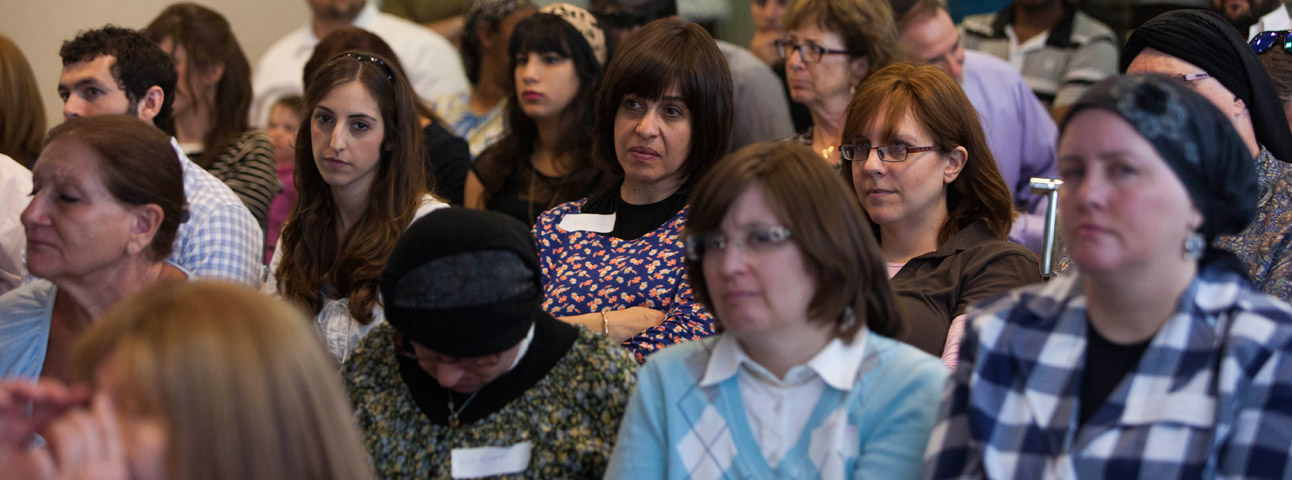Integrating Women into Politics: Another Solution
The absolute exclusion of women from ultra-Orthodox parties keeps their specific interests from being addressed effectively in the public sphere.

Illustration | Flash 90
There is a great deal of disingenuousness in Yisrael Cohen’s statement that the call to remove the signs demanding gender segregation from the sidewalks of Beit Shemesh constitutes secular-liberal coercion. “A closed community living in Beit Shemesh wishes to observe a stringency in religious law,” he said. It makes the idea sound almost picturesque. Then along comes the liberal state, running roughshod over the community’s way of life by trying to force alien values upon it. What about tolerance? What about pluralism? It sounds quite threatening, actually. Perhaps the basic idea of tolerance and pluralism has gotten lost amid the background noise of radical multi-culturalism. Therefore, it must be stated once again: Liberalism has red lines, too. If the State of Israel is willing to tolerate the sort of humiliating acts that are being perpetrated against women in Beit Shemesh, why should it not allow polygyny — or even female genital mutilation — as well?
Cohen’s manipulative statement about the High Court of Justice petition that would nullify Agudath Israel rule preventing women from being party members — and therefore from serving as its elected officials — contains a different sort of disingenuousness, to say nothing of deception. As Cohen would have it, if Agudath Israel is forced to include women, what’s next? Will Shas have to include Jews of Ashkenazic ethnicity, and will Balad have to allow Jews to join? Where does one draw the line? But this equation is fundamentally flawed. The gender divide between men and women is utterly different from the social divides, particularly when it comes to women’s inclusion in politics. Women comprise approximately half of the population. It is therefore inconceivable that a democratic country should allow parties to forbid women, explicitly, from taking part in their activity.
The absolute exclusion of women from ultra-Orthodox parties keeps their specific interests from being addressed effectively in the public sphere. The presence of women in political positions is different from the issue of appropriate representation or political visibility. It is also a question of substance. A survey by the Israel Democracy Institute that examined the activity patterns of members of the seventeenth and eighteenth Knessets found — as happens in much of the democratic world — that the view that men represent women as well as women represent themselves, and that men work as hard as women do to promote women’s interests, is false. The survey found that women Knesset members are more involved in promoting bills and raising parliamentary queries on subjects that have to do with the family, children, and women’s rights, while male Knesset members tend to avoid them. This means that if women do not work for women’s welfare, rights, and betterment in society, no one else is likely do it for them. The promotion of more women from various sectors, including the ultra-Orthodox sector, to key political positions will therefore lead to a good deal more work on a broader spectrum of subjects that are probably not receiving enough attention.
It is very much in Israel’s interest to work for greater representation by women in the various political spheres. We agree that the right way to accomplish this need not be through coercive measures, such as disqualifying parties that bar women from running for office. At the same time, the state needs to take a principled position on the matter and create incentives for parties to include more women as candidates. For example, a rule should be made that parties whose candidate lists are made up of at least 40 percent women will receive higher public funding. A step in this direction has already been taken on the local level with an amendment to the law, enacted three years ago, that gives a bonus to elected lists on which women make up at least one-third of their city council members. The local elections to be held in October 2018 will be a pilot program for this measure, and we hope to see an improvement in women’s representation at the local level.
Even if the High Court of Justice should accept the petition and order Agudath Israel to lift the restriction barring women from party membership, this will not necessarily lead to women becoming candidates on the party’s Knesset list or city councils. After all, unlike the parties that conduct democratic procedures, the rabbis — and the local community leaders who have their ears — are the ones who draw up the ultra-Orthodox parties’ candidate lists. But even if the ruling has no immediate effect, it will still be an important decision in principle in favor of equality and the inclusion of women in the public sphere. A ruling of this kind could prove highly significant in the long term by opening the door to the inclusion of ultra-Orthodox women in political life.
